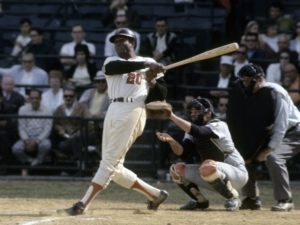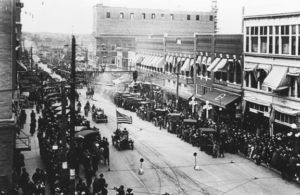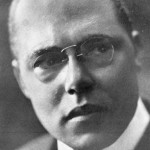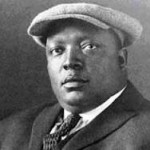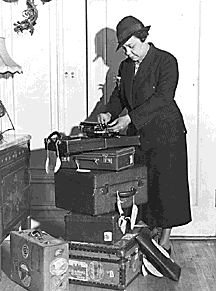Life Aboard a Slave Ship
(History.com) Video: TV-PG, 4:02 (graphic content)
From approximately 1525 to 1866, 12.5 million Africans were forcibly transported across the Middle Passage to serve as slaves in the New World. Life aboard slave ships was agonizing and dangerous; nearly 2 million slaves would perish on their journey across the Atlantic. (watch)
Smithsonian Curator Weighs in on Legacy of Frank Robinson, Barrier-Breaking Baseball Great
Robinson was one of the great all-time home run hitters and made history when he became the manager of the Cleveland Indians
(Smithsonian) During his 21 seasons as an outfielder, first with the Cincinnati Reds and later with the Baltimore Orioles among other teams, Major League Baseball hall of famer Frank Robinson accumulated some of the best stats in baseball history. He hit 586 career home runs, was named an All-Star 14 times and remains the only player to earn the Most Valuable Player award in both leagues, receiving the title in 1961 for his work with the Reds and in 1966 while playing for the Orioles, respectively.
But it’s his work in the dugout that will especially go down in history. Robinson, who died at his home outside Los Angeles at the age of 83 on Thursday, February 7, was the first African-American manager of a major league team, taking the helm of the Cleveland Indians in the spring of 1975.
Damion Thomas, curator of sports at the Smithsonian’s National Museum of African American History and Culture, says Robinson’s transition to the manager’s seat helped fulfill one of Jackie Robinson’s dreams. Before his death in 1972, Jackie was adamant that for segregation in baseball to truly be over, African Americans needed to be allowed into management and ownership. Robinson’s move in 1975 was a fulfillment of that dream, part of the first wave of African Americans moving into management positions in the corporate world, academia and elsewhere. (more)
Researchers seek fuller picture of first Africans in America

In this April 10, 2018, file photo, Historic Jamestown staff archaeologist Lee McBee displays artifacts as he talks with visitors at the dig site of the Angelo slave house in Jamestown, Va. A few historical markers and records mention these early slaves, but there’s been scant research on their lives. (Associated Press)
(Daily Herald) The first Africans to arrive in English-controlled North America were so little noted by history that many are known today by only their first names: Antony and Isabella, Angelo, Frances and Peter.
Almost 400 years ago, they were kidnapped and forcibly sailed across the ocean aboard three slave ships – the San Juan Bautista, the White Lion and the Treasurer – and then sold into bondage in Virginia.
Now their descendants, along with historians and genealogists, are seeking recognition for a group of 20-some Africans they describe as critical to the survival of Jamestown, England’s first successful settlement in North America.
“We need to reclaim our history. We need to tell our story,” said Calvin Pearson, head of Project 1619 , which is named after the year those first Africans landed near what became Hampton, Virginia.
A few historical markers and records mention these early slaves, but there’s been scant research on their lives. President Barack Obama made the area where they arrived a national monument in 2011 to ensure that its history was not lost, and Pearson and others are working to learn more. (more)
Tulsa Just Received $1M for A Project Commemorating Black Wall Street
(AfroTech) The city of Tulsa will receive $1 million from Bloomberg Philanthropies to fund an art project commemorating the legacy of Greenwood, or Black Wallstreet as it has been commonly called.
The Greenwood Art Project—named after the historic Black Wall Street neighborhood—will address civic issues and aims to deepen the understanding of the community’s story of triumph.
A team led by internationally renowned artist Rick Lowe will create eight art installations throughout the Greenwood District. (more)
TIPHC Bookshelf
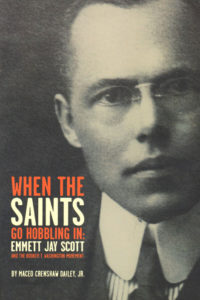 Published scholarship on black history in Texas is growing and we’d like to share with you some suggested readings, both current and past, from some of the preeminent history scholars in Texas and beyond. We invite you to take a look at our bookshelf page – including a featured selection – and check back as the list grows. A different selection will be featured each week. We welcome suggestions and reviews. This week, we offer, “When the Saints Go Hobbling In,” by Maceo Crenshaw Dailey, Jr.
Published scholarship on black history in Texas is growing and we’d like to share with you some suggested readings, both current and past, from some of the preeminent history scholars in Texas and beyond. We invite you to take a look at our bookshelf page – including a featured selection – and check back as the list grows. A different selection will be featured each week. We welcome suggestions and reviews. This week, we offer, “When the Saints Go Hobbling In,” by Maceo Crenshaw Dailey, Jr.
Challenging several of the commonly held views about Booker T. Washington and his followers, this collection of essays offers a new estimation of their accomplishments and successes as having been greater than previously recognized by historians. Criticized for his gradual approach and often called an accommodationist in his own time, Booker T. Washington’s influence on civil rights was nonetheless significant and his writing continues to educate on the efforts of post-Emancipation America. The book explores his connections with presidents, such as Theodore Roosevelt and Calvin Coolidge, and examines the issues of black entrepreneurship in both in the United States and Africa—providing guidance for today’s African American community to seek a way and means to deal with economic dislocation and despair. It also presents a thorough study of Washington’s secretary, Emmett Jay Scott, whose own influence as a leader continued well into the modern era through his familial connections to the Black Panther Party. This important collection will round out scholarly studies of Booker T. Washington and the movement he created with the fresh perspective it presents.
This Week in Texas Black History
Feb. 13
On this day in 1873, Emmett J. Scott was born in Houston. Scott was a journalist and administrator who worked for the Houston Post, but in 1894 he founded Houston’s first black newspaper, the Houston Freeman, a weekly newspaper. For many years, Scott was the personal secretary for Booker T. Washington, and during World War I was in charge of Negro affairs as a special assistant to the U.S. Secretary of War. That position made Scott the highest ranking black person in President Woodrow Wilson’s administration and led to many changes for black soldiers with many of the issues they faced and the participation of black units in World War I outlined in Scott’s Official History of the American Negro in the World War (1919). Among the changes Scott helped to bring about were:
- The continuance of training camps for black officers and the increase in their number and an enlargement of their scope of training.
- Betterment of the general conditions in the camps where blacks are stationed in large numbers, and positive steps taken to reduce race friction to a minimum wherever soldiers of opposite races are brought into contact.
- An increase from four to 60 in the number of black Army chaplains.
- The opening of every branch of the military service to black men, on equal terms with all others, and the commissioning of many black men as officers in the Medical Corps.
- Large increase in the number of black line officers with the total increasing from less than a dozen at the beginning of the war to more than 1,200.
Feb. 13
In 1920, on this date, Rube Foster – a native of Calvert, Texas – led the founding of baseball’s first successful all-black league, the Negro National League, headquartered in Kansas City, Mo. Foster was league president, as well as manager and player (pitcher) for the Chicago American Giants. He is known as “the father of black baseball.”
Feb. 15
Dallas journalist and publicist Fay Jackson was born on this day in 1902. Jackson founded Flash in the late 1920s, the first black news magazine on the West Coast and during the 1930s she became the first black Hollywood correspondent with the Associated Negro Press (ANP). Jackson was also the ANP’s first black foreign correspondent.
Blog: Ron Goodwin, Ph.D., author, PVAMU history professor
Ron Goodwin is an assistant professor of history at Prairie View A&M University. Even though he was a military “brat,” he still considers San Antonio home. Like his father and brother, Ron joined the U.S. Air Force and while enlisted received his undergraduate degree from Texas Lutheran University in Seguin, Texas. After his honorable discharge, he completed graduate degrees from Texas Southern University. Goodwin’s book, Blacks in Houston, is a pictorial history of Houston’s black community. His most recent book, Remembering the Days of Sorrow, examines the institution of slavery in Texas from the perspective of the New Deal’s Slave Narratives.
Recent Posts
The Return of the Silent Majority
Fifty years ago, in January 1969, Richard Nixon was sworn in as the thirty-seventh president of the United States. His legacy as President was marred by the Watergate investigations and his eventual resignation from office which overshadowed the way in which he won the office. His central campaign rhetoric was designed to garner support from white Southerners (otherwise known in history as the “Silent Majority”) whose racial beliefs leaned heavily towards the support of white…(more)
Uncommon integrity
I, (NAME), do solemnly swear (or affirm) that I will support and defend the Constitution of the United States against all enemies, foreign and domestic; that I will bear true faith and allegiance to the same; and that I will obey the orders of the President of the United States and the orders of the officers appointed over me, according to regulations and the Uniform Code of Military Justice. So help me God. — Military Oath…(more)
Submissions wanted
Historians, scholars, students, lend us your…writings. Help us produce the most comprehensive documentation ever undertaken for the African American experience in Texas. We encourage you to contribute items about people, places, events, issues, politics/legislation, sports, entertainment, religion, etc., as general entries or essays. Our documentation is wide-ranging and diverse, and you may research and write about the subject of your interest or, to start, please consult our list of suggested biographical entries and see submission guidelines. However, all topics must be approved by TIPHC editors before beginning your research/writing.
We welcome your questions or comments. Please contact Michael Hurd, Director of TIPHC, at mdhurd@pvamu.edu.

